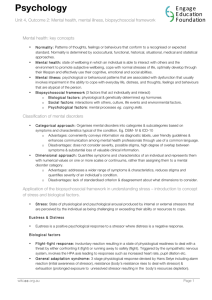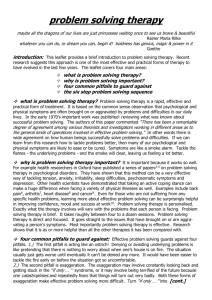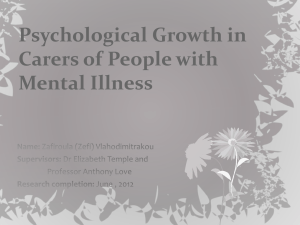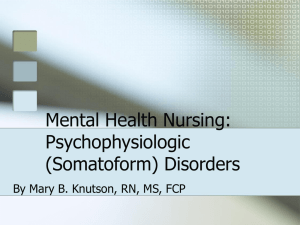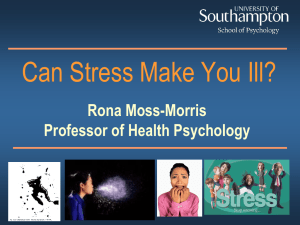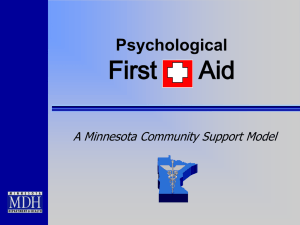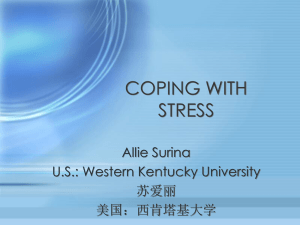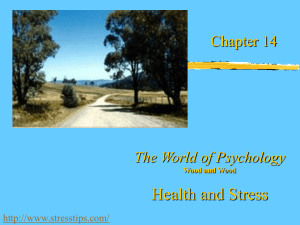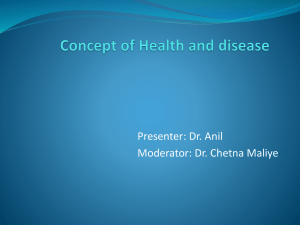Stress and Illness
advertisement
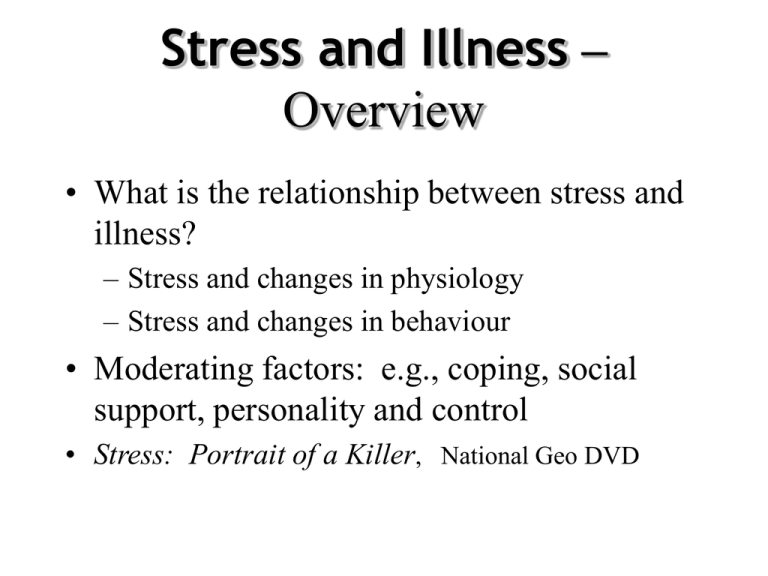
Stress and Illness – Overview • What is the relationship between stress and illness? – Stress and changes in physiology – Stress and changes in behaviour • Moderating factors: e.g., coping, social support, personality and control • Stress: Portrait of a Killer, National Geo DVD Stress and Illness – Key point If you repeatedly turn on the stress-response, or if you cannot appropriately turn off the stress-response at the end of a stressful event, the stress-response can eventually become as damaging as some stressors themselves. A large percentage of stress-related diseases are disorders of excessive stress-response. Robert Sapolsky – Why Zebras Don’t Get Ulcers Psychophysiological model of the stress response Fig. 1. Negative emotionality in children with one of two brain-derived neurotrophic factor (BDNF) genotypes—valine (val) homozygous or at least one methionine (met) allele—as a function of the presence or absence of parental depression (n = 400). Hayden E P et al. Psychological Science 2010;0956797610385357 Copyright © by Association for Psychological Science Fig. 2. Negative emotionality in children with one of two brain-derived neurotrophic factor (BDNF) genotypes—valine (val) homozygous or at least one methionine (met) allele—as a function of the presence or absence of parental discord (n = 332). Hayden E P et al. Psychological Science 2010;0956797610385357 Copyright © by Association for Psychological Science Psychophysiological model of the stress response Psychophysiological model of the stress response This acute response is not typically problematic. Chronically, however, it’s a different story… Health Consequences of Chronic Stress SAM BP, HR, epi) HPA immunosuppression Coronary Heart Disease and Stress • Rates of CHD is higher in those with high stress jobs. Why? – BP chronically elevated (wear and tear!) – Epi circulating platelets clump together – Atherosclerosis (plaques) • Kaplan’s research with monkeys (re: social stress & unstable hierarchy -- low control) Research study: “Overload in Working Mothers” • BCBS workers • Measures: – Urine samples (to look for metabolites of stress hormones) – Daily mood scale • Results: feel stressed (esp w/ children at home) – High stress (low perceived control + high demand) – increased urinary neurohormones Immunity and Stress T cell Immune System Overview Psychoneuroimmunology (PNI) • Subfield of health psychology that emphasizes the interaction of psychological, neuroendocrine, and immunological processes in stress and illness PNI: From stressor to illness • We differ as to the pattern and frequency of stressors to which we are exposed • These variations determine the magnitude and frequency with which we turn on the stressresponse • The magnitude and frequency of the stress response regulate immune competence (e.g., via glucocorticoids) • Level of immune competence determines susceptibility to disease PNI Studies • Immunosuppression has been linked to divorce, bereavement, unemployment, exam periods, occupational stress, and stressful bouts of exercise – e.g., Life stress and exposure to cold viruses • Wound studies (Kiecolt-Glaser) • Animal studies show that tumor cells grow more rapidly in animals exposed to electric shock, loud noise, or other stressors Sapolsky’s baboons • High and Low Social Status – High cortisol is associated with low social status (instability and less controllability) – Low status – Fewer lymphocytes and weak immune system Sapolsky’s baboons Studies with dominant male baboons suggest that attitude (“personality”) is a more important mediator of physiology than rank alone (i.e., just being alpha male isn’t necessarily good, if one is high-strung about it…) Moderators of the stress-illness relationship Perception / Appraisal Personality Social Support Control Coping skills How do these relate to you? What gets you “stressed” and why? Moderators of the stress-illness relationship: Perception Many situations are not inherently stressful… depends on appraisal: Primary appraisal — determination of an event’s meaning Secondary appraisal — evaluation of one’s ability to meet the demands of a challenging event Cognitive appraisals are extremely susceptible to one’s current state of mood, health, motivation Perception and stress “I have had a great many troubles in my life… And most never happened…” Mark Twain Developing Coping Skills Increasing social support Time management Emotion-focused coping or problem-focused coping Reducing the impact of the stress reaction Etc…
